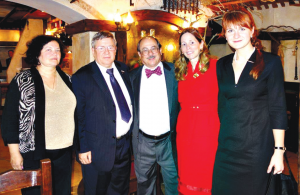by Joseph P. Tartaro | Executive Editor

Among the international civilian gun rights advocates meeting in Moscow, Oct. 31 and Nov. 1 were, left to right: Mrs. Alexander Torshin; Russian Sen. Torshin; Alan M. Gottlieb, Julianne Versnel and Maria Butina, shown here after a dinner meeting in the Russian capital. Sen. Torshin is the First Deputy Chairman of the Federal Assembly, the Russian Parliament. Butina is the head of Bear Arms Russia, who chaired the two-day conference. Gottlieb and Versnel are directors of the International Association for the Protection of Civilian Arms Rights.
Americans are not alone in having a fundamental desire for a right to keep and bear firearms for self-defense.
While the right to arms continues to be an important political, legal and media struggle in the United States, representatives of dozens of countries from around the world gathered in Moscow to press their case for greater access to personal arms.
Representatives of gun rights associations from 56 Russian provinces were in attendance and speaking as well as Russian political leaders and firearms manufacturers.
They were joined by representatives from countries in eastern and Western Europe and Asia, including India, Israel, Italy and the USA.
The event was the 2nd Annual Meeting of international gun rights organizations hosted by the Moscow-based Right to Bear Arms organization, and the UN Arms Trade Treaty was as much a key topic as the arms rights debate in all of the nations involved in the conference.
In all, over 200 people participated in six-languages, with participants listening through headphones with UN-style multiple immediate translations.
Alan Gottlieb, founder of the Second Amendment Foundation (SAF) and chairman of the Citizens Committee for the Right to Keep and Bear Arms, was the leadoff speaker. Gottlieb is also the founder and a director of the International Association for the Protection of Civilian Arms Rights (IAPCAR), of which the Russian Right to Bear Arms association is a long-time member.
Gottlieb told TGM that he believed there was considerable support in the Russian parliament for more relaxed firearms rights legislation, but it was unclear whether there was yet enough for a majority.
Julianne Versnel, a representative to the United Nations, who is also the Second Amendment Foundation’s Director of Operations, also spoke early at the Moscow meeting. During the UN’s deliberations of the Arms Trade Treaty in March she submitted testimony objecting to the exclusion of civilian arms rights from the ATT.
“Nothing that is in an Arms Trade Treaty should affect a woman’s right to defend herself,” Versnel told the delegates, as she linked the arms rights debate to earlier adoption of UN treaties on human rights that focused on women.
Former National Rifle Association President David Keene also spoke later in the program, representing the Association. The NRA and SAF are both members of the World Forum on Shooting Sports.
Immediately after the Moscow meeting, IAPCAR announced that civilian arms rights groups in the Ukraine, Moldova, and Belarus had joined the international coalition of 28 associations in 20 countries dedicated to the preservation and defense of civilian firearms rights.
They include the Ukrainian Gun Owners Association, Moldova’s Practical Shooting Association, and the Association of Practical Shooting in Belarus.
“The global coalition of like-minded civilian arms rights groups is unified with greater strength in Europe now more than ever before,” IAPCAR’s Executive Director Philip Watson said. “I think most people agree with the right of self-defense, that’s why our coalition just continues to grow.” The three groups will expand the European membership of IAPCAR to ten groups from ten different EU and non-EU countries.
The IAPCAR civilian arms rights coalition is focused on opposition to the ATT, which does not acknowledge or protect civilian arms rights or recognize the right to self-defense in its enforceable language.
Civilian arms rights vary considerably from country to country.
Readers are familiar with the fact that Americans face a hodgepodge of state gun laws as well as federal laws and regulations.
In other nations, the right to arms may be more stringently controlled.
In Russia, for example, civilians may own hunting rifles and shotguns, plus gas-powered pistols, but cartridge guns, whether for home protection or concealed carry, are almost totally prohibited, and licensing and registration many vary considerably from one province to another.
Presently, many Russian lawmakers are pressing for a relaxation of laws regulating pistols for possession outside the home.
The cultural program at the meeting featured an exhibition of photographic work by Olga Volk, a Russian-American freelance photographer that focused on the theme of people carrying civilian weapons, prepared to defend their families and homes.



